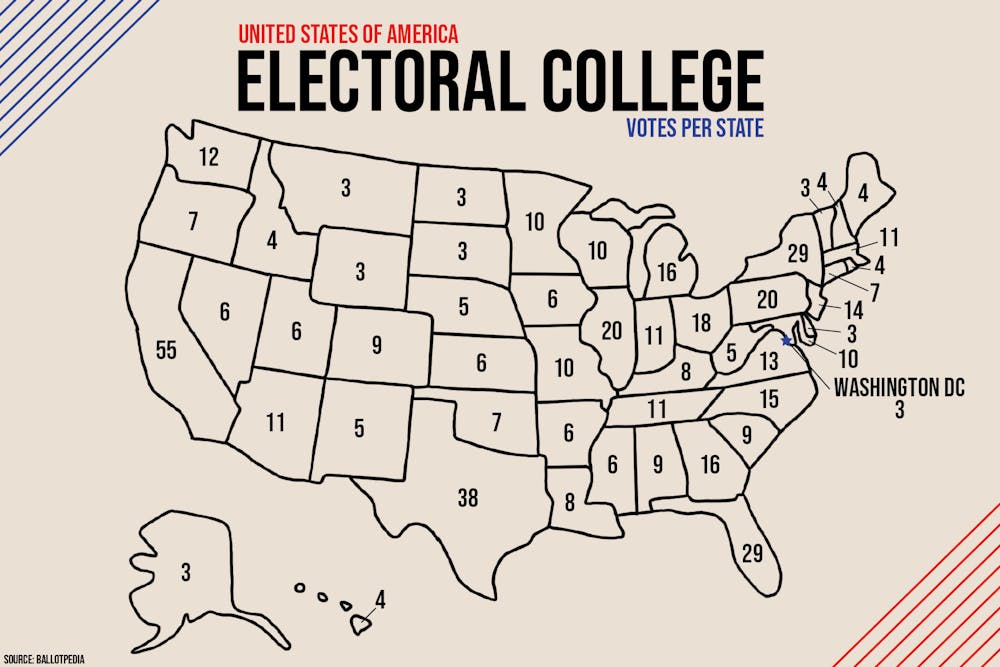The existence of the Electoral College is detrimental to American politics. It is a relic of the past that must either be updated for modern times or be confined to the dustbin of history entirely.
The Electoral College and its winner-take-all system are partially responsible for the continued existence of the two-party system and various other problems. The former is proven due to the “spoiler effect” where any viable third party simply siphons votes away from the other candidate that is the closest to its beliefs, something that has been proven multiple times, such as in 1912 with Theodore Roosevelt’s run or in 2000 with Ralph Nader's run.
Additionally, the winner-take-all system silences voters. Because of this rule, it doesn’t matter if a candidate wins by 0.1% or by 10%. Those extra votes might as well not have been cast.
Furthermore, unless a citizen lives in a swing state, if a citizen has opposing beliefs to the dominant party, they might feel they don’t really have a say in their government. For example, if a Republican lives in California or a Democrat lives in Wyoming, they have almost no chance of winning and could understandably be disincentivized to vote. If the college wasn’t the way it is, suddenly, all of those votes would be viable and really matter.
On top of that, the college is inherently undemocratic. Due to the cap on the House of Representatives, the Electoral College is stuck distributing 538 electoral votes among the continually growing states. This has created a disparity in how many people are represented by one electoral vote.
In California, one elector represents roughly 720,000 people. Meanwhile in Wyoming, it represents roughly 200,000 people. That difference is enough people to fill a state and is fundamentally incompatible with the American belief of “one person, one vote.”
Now, as a defense, many will probably jump and say, “America isn’t a democracy, it’s a republic.” This is a bad faith argument. A republic is simply a representative democracy, a system where Americans democratically elect representatives to sponsor their beliefs in Congress.
And whenever people parrot that phrase, they usually spout various quotes from the Founding Fathers who criticized democracy. What people don’t tell you is that the Founding Fathers were referring to direct democracy, a system with no representatives, where the people themselves vote on literally every law and issue. James Madison, the father of the Constitution himself, distinguished between the two forms of government in Federalist Paper No. 14.
No one is arguing America should be a direct democracy — such a system is simply not feasible. Anyone who uses that phrase as a defense either doesn’t fully understand it or is simply trying to draw attention away from the issue.
But despite these issues, the Electoral College is likely here to stay. Removing it would require a constitutional amendment, which is beyond a non-starter at this time. However, there are other ways of circumventing it that would effectively make it obsolete.
Number one would be having states adopt ranked choice voting systems. Maine made history this year by doing so, and it would be the first step in breaking the two-party system the college fuels.
Maine also provides an example of another method of reform: the congressional district method. This method, used by both Maine and Nebraska, has the state allocate its electoral votes by their congressional district, which helps the result be more proportional than the result of the statewide popular vote.
However, the more interesting and drastic reform that could potentially occur in the near future is the National Popular Vote Interstate Compact. This plan would be passed on the state level and is basically an agreement between states to give their electoral votes to the winner of the popular vote no matter what.
This loophole fulfills the constitutional mandate of a college while at the same time pretending it doesn’t exist. However, this plan wouldn’t work unless enough states totaling 270 electoral votes join the compact. As of now, it sits with 196 electoral votes.
But for now, America is stuck with the Electoral College. Was there a time when the college was necessary? Perhaps. However, that time has past. It is high time for America to move on or reform.

